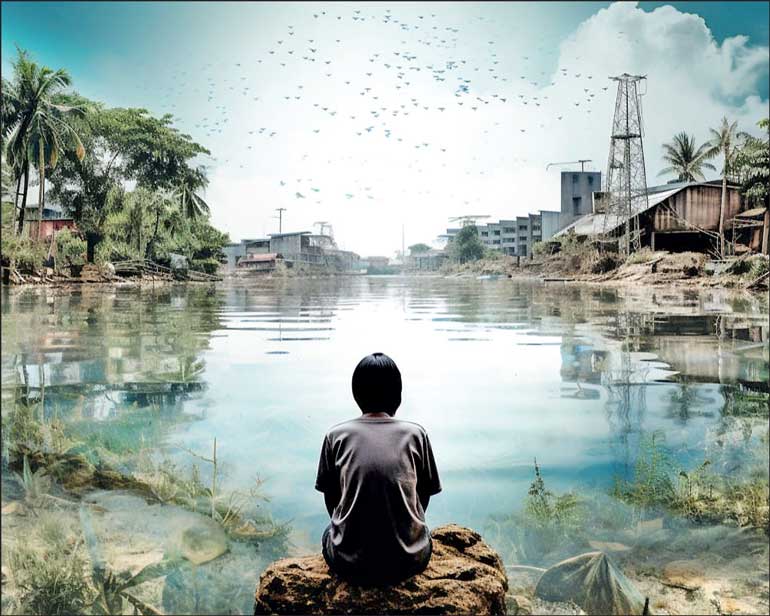Sunday Feb 15, 2026
Sunday Feb 15, 2026
Saturday, 7 October 2023 00:10 - - {{hitsCtrl.values.hits}}

The Global Goal on Adaptation could play a key role in reducing vulnerability to climate change and building long-term resilience in countries such as Sri Lanka
 Climate change adaptation plays a key role in reducing vulnerability to climate change and building long-term resilience. As defined in the Sixth Assessment Report published by the Intergovernmental Panel on Climate Change, adaptation is the process of “adjustment to actual or expected climate and its effects in order to moderate harm or take advantage of beneficial opportunities,” which can be achieved through a multitude of different methods and actions.
Climate change adaptation plays a key role in reducing vulnerability to climate change and building long-term resilience. As defined in the Sixth Assessment Report published by the Intergovernmental Panel on Climate Change, adaptation is the process of “adjustment to actual or expected climate and its effects in order to moderate harm or take advantage of beneficial opportunities,” which can be achieved through a multitude of different methods and actions.
However, while adaptation action and planning usually happens at the local and national level, they are linked and connected to global processes. For example, negotiations under the United Nations Framework Convention on Climate Change (UNFCCC) aim to strengthen ambition around adaptation, build coherence on adaptation planning and policies, and mobilise means of implementation, including finance, technology, data, capacity-building, and technical support. An overarching global goal for adaptation could provide a framework for reporting, monitoring, and evaluation, catalyse additional means of implementation, and serve as a benchmark and north star for adaptation efforts in countries around the world, particularly climate-vulnerable developing ones.
Operationalising a global goal with national consequences
The Global Goal on Adaptation (GGA) was established in 2015 as part of the Paris Agreement to complement the Agreement’s temperature goal of 1.5 degrees Celsius. It aims at “enhancing adaptive capacity, strengthening resilience, and reducing vulnerability to climate change” while also contributing to sustainable development. However, since the Paris Agreement, the GGA has not been further operationalised, and Parties have not yet agreed on its concrete nature and modalities.
At the 26th meeting of the Conference of the Parties to the UNFCCC (COP26), the Glasgow-Sharm el-Sheikh work program was created to fill this gap and enable full implementation of the GGA. Spanning two years and eight workshops, the work program has eight objectives, which include enhancing the understanding of the GGA; contributing to an overall progress assessment on adaptation; enhancing national adaptation planning and implementation; enabling Parties to better communicate their priorities and needs; and establishing monitoring and evaluation systems.
As of now, all eight workshops have taken place in 2022 and 2023, focusing on topics such as potential principles, components, characteristics, targets, metrics, scales, indicators, methods, and approaches; sequencing; existing gaps and barriers for adaptation; enabling conditions and means of implementation; local, national, regional, and global perspectives; linkages to the Global Stocktake (GST) and other processes within and outside the UNFCCC; baselines and forward-looking approaches; stakeholder roles; transformational adaptation; indigenous knowledge; themes and cross-cutting considerations; establishment of a framework; structural elements and stakeholder roles; and international cooperation.
However, even after the 8th workshop, which took place from 27 to 29 September, some questions remain open. What will be the final targets and metrics that define the GGA? How can they enhance adaptation ambition? What are mechanisms for countries to report on their efforts and achievements without facing additional burdens? And how will the GGA inform the Global Stocktake and ensure complementarity or coherence with other global targets, such as the Sustainable Development Goals, the Sendai Framework for Disaster Risk Reduction, or the Kunming-Montreal Global Biodiversity Framework?
Parties will have to decide on these questions and how to operationalise the GGA at the 28th meeting of the Conference of the Parties (COP28) to the UNFCCC at the end of this year, including on how to proceed in the next years and towards other important milestones, such as the second Global Stocktake or the update of Nationally Determined Contributions.
Working towards alignment and convergence
From 12 to 14 September, an international dialogue on the Global Goal on Adaptation was held in Colombo to put a spotlight on the remaining open questions.
The event, which was hosted by non-profit think tank SLYCAN Trust under the auspices of the Ministry of Environment of Sri Lanka, brought together negotiators from developing countries and key negotiation blocs under the UNFCCC system to advance the discussions and provide an additional space for dialogue on priorities and potential areas of convergence. Key topics of discussion included the establishment of a concrete framework for the GGA, the prioritisation and clustering of targets, elements to discuss at the 8th workshop, and potential ways forward at and beyond COP28, which is expected to conclude the Glasgow-Sharm el-Sheikh work program and operationalise the GGA.
With only one more workshop and less than three months to go before COP28, it is critical for Parties to find landing zones and reach alignment on key questions. For countries such as Sri Lanka, the outcome of these deliberations could provide guidance on implementation and reporting as well as potential avenues to access means of implementation, for example, in the context of the country’s National Adaptation Plan, the adaptation components of its Nationally Determined Contributions, and projects aiming to scale up adaptive capacities.
Due to the highly context-specific nature of climate change adaptation, establishing a global goal is a challenging and complex endeavour, but it has the potential to highlight best practices, compile existing information, and strengthen adaptation planning and implementation at the local and national level, which is an urgent need especially in light of increasing climatic changes and impacts.
(The writer works as Director: Research and Knowledge Management at SLYCAN Trust, a non-profit think tank based in Sri Lanka. His work focuses on climate change, adaptation, resilience, ecosystem conservation, just transition, human mobility, and a range of related issues. He holds a Master’s degree in Education from the University of Cologne, Germany and is a regular writer to several international and local media outlets.)